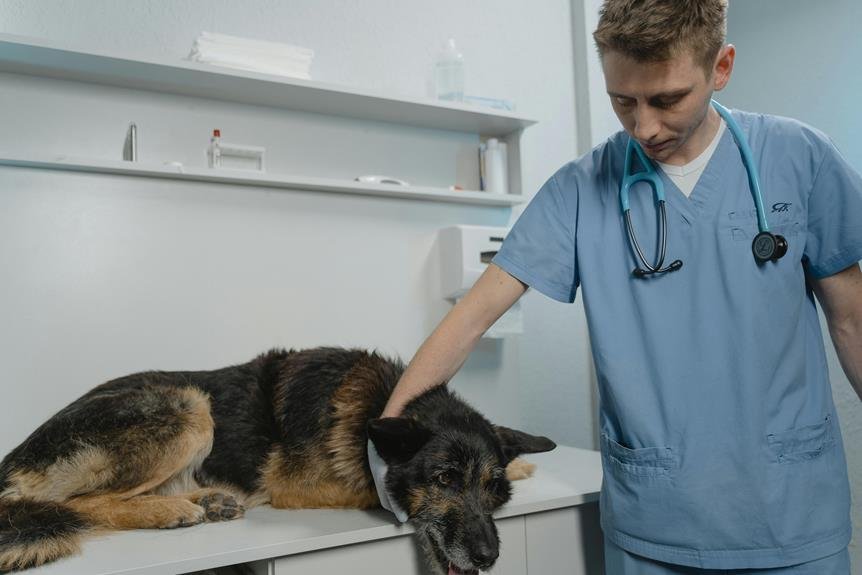
When it comes to your furry companion's well-being, scheduling regular visits to the vet is paramount. But have you ever wondered how often you should be taking your dog for these check-ups? The frequency of vet visits can vary based on your dog's age and health status. By understanding the guidelines for different life stages, you can ensure your canine friend receives the best possible care. But what exactly determines the ideal frequency of vet visits for your beloved pet?
Puppies (Up to 1 Year Old)
During the first year of their life, puppies should visit the vet at least six times for vaccinations and check-ups. These visits are crucial for ensuring your puppy's health and well-being as they grow and develop. Vaccinations protect your puppy from serious diseases like rabies, distemper, parvovirus, and more. By following the recommended vaccination schedule, you can help prevent these illnesses and keep your furry friend healthy.
Regular check-ups are also essential during your puppy's first year. The vet will monitor your puppy's growth, weight, and overall health to catch any potential issues early on. These visits are a great opportunity to ask any questions you may have about caring for your puppy, from nutrition to behavior.
In addition to vaccinations and check-ups, your vet can provide guidance on training, socialization, and other aspects of puppy care. Building a strong relationship with your vet early on will set a positive foundation for your puppy's lifelong health and happiness.
Adult Dogs (1-7 Years Old)
For adult dogs aged 1-7 years old, regular veterinary check-ups are essential to maintain their health and well-being. Just like humans, dogs can develop various health issues as they age, making it crucial to stay on top of their medical care. During these years, an annual visit to the vet is generally recommended. These check-ups allow the veterinarian to assess your dog's overall health, update vaccinations if needed, and check for any signs of illness or disease that may not be apparent to you.
Additionally, adult dogs may benefit from preventive treatments such as regular dental cleanings, parasite control, and screenings for conditions like heartworm disease. Your vet can also offer guidance on nutrition, exercise, and behavior to ensure your dog is living their best life. Remember, early detection of health problems can lead to more effective treatments and better outcomes for your furry friend. So, schedule those yearly check-ups to keep your adult dog healthy and happy for years to come.
Senior Dogs (7+ Years Old)
As your dog enters their senior years at 7 years old and beyond, regular veterinary check-ups remain vital to monitor their health and address any age-related concerns promptly. Senior dogs are more prone to various health issues such as arthritis, dental problems, vision or hearing loss, obesity, and organ diseases. These check-ups help catch any potential problems early, increasing the chances of successful treatment and improving your dog's quality of life.
During these visits, your vet may recommend more frequent examinations, blood tests, and screenings to detect age-related conditions. They might also suggest adjustments to your dog's diet, exercise routine, or medications to better suit their changing needs. Additionally, dental care becomes even more critical for senior dogs, as dental disease can lead to other health issues if left untreated.
Preventative Care and Special Considerations
Regular veterinary check-ups for your senior dog are essential for preventative care and addressing special considerations related to their age. As your dog ages, they become more susceptible to various health issues such as arthritis, dental problems, and cognitive dysfunction. During these check-ups, your vet can conduct thorough examinations to detect any potential problems early on, allowing for prompt intervention.
In addition to regular check-ups, preventative care for senior dogs may include vaccinations, parasite control, and dental cleanings. Vaccinations help protect your dog from diseases, while parasite control prevents infestations that can be particularly harmful to older dogs. Dental cleanings are crucial as dental issues can lead to other health problems if left untreated.
Special considerations for senior dogs may involve adjusting their diet to meet their changing nutritional needs, incorporating supplements to support joint health, and providing a comfortable environment that accommodates any mobility issues. By staying proactive with preventative care and addressing specific age-related concerns, you can help ensure a higher quality of life for your beloved senior canine companion.




